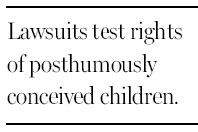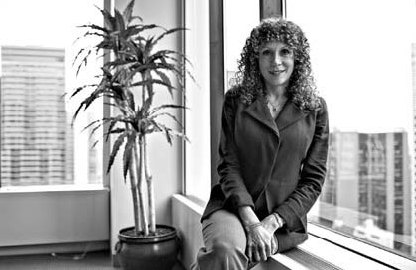Death, and then a baby. What about the estate?
Updated: 2013-09-29 07:25
By Paul Sullivan(The New York Times)
|
|||||||
The number of children conceived through in vitro fertilization has doubled over the last decade. The technology that has made these children possible has also challenged inheritance laws, especially when a child is conceived after the death of a parent.
Posthumously conceived children can become a quandary for the rich and the not-so-rich alike. The problem is always about money. The rich worry about who will get their assets after they are dead, while people of more meager means have turned to the courts in the hope of collecting government benefits.
"We're going to see a flurry of activity on this, because new technologies are ballooning," said Sharon L. Klein of Wilmington Trust, based in Delaware.
"You read about women in their late 20s and early 30s who are saving their eggs and want to focus on their careers and haven't met the right partner yet," she said. The woman's eggs could be used to produce a child even if the woman never wanted the eggs used after her death.
|
Sharon L. Klein of Wilmington Trust says advances in the science of reproduction have led to complex legal issues. Benjamin Norman for The New York Times |
The law is clear on one thing: when a trust document does not address the issue, Ms. Klein said, "children born with the new technology are entitled to inherit with the same rights as a natural-born child."
Consider the example of a sick person who, before undergoing chemotherapy that will cause sterility, donates sperm or eggs to be frozen, in hopes of having children later. But should the patient die without something in writing stating this intent, the surviving partner could have a claim on that genetic material.
Other possibilities exist. A couple with embryos left over after having children through in vitro fertilization could, instead of destroying them, donate them to a woman, essentially giving her a child they created. That could have unintended consequences. "It's not inconceivable now that if the father and mother of that embryo were to strike it rich, the child born of that other woman could say, 'Those are my genetic parents,' " said John M. Olivieri, a partner at White & Case.
"Posthumous reproduction is the perfect storm of competing interests," said Susan M. Wolf of the University of Minnesota School of Law. "There's the surviving partner who wants to reproduce, the interests of the deceased while they were alive or as they memorialized them, the pre-existing kids who don't want their interest diluted and finally the kids who are brought into the picture but who may be financially most at risk."
Several lawsuits have already tested this issue, and many more have been settled privately.

In 2007, the New York County Surrogate's Court decided in one case that two posthumously conceived children could benefit from a trust created by their grandfather for his two sons and any grandchildren.
At the other end of the economic spectrum is a case brought by a woman against the United States Social Security Administration to claim benefits for twins conceived after her husband died.
Last year, the United States Supreme Court reversed a lower-court ruling and said that state law should determine such claims. Since at the time of his death the father lived in Florida, which does not recognize posthumously conceived children not mentioned in a will, the woman could not receive government benefits for them.
When it comes to setting up a trust for children conceived after death, the conversation shifts. Joshua S. Rubenstein, an attorney in New York, said he had pressed clients to consider this issue for more than a decade.
"To anyone who thinks about it, 99 times out of 100 they don't want to include children born after they're dead," he said. "They've lived with their own kids and they want them to get their things and not some kid who was born years later that they never knew."
The New York Times
(China Daily 09/29/2013 page10)
